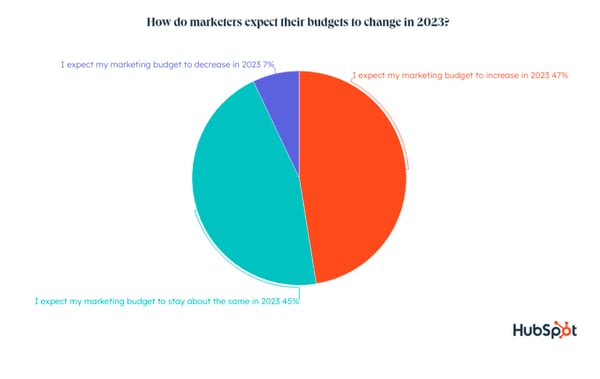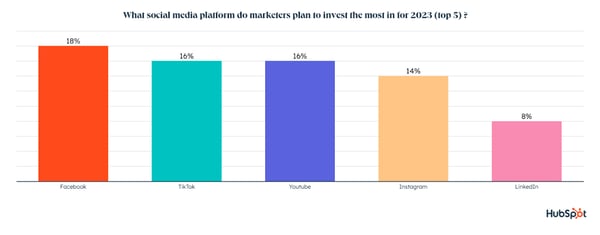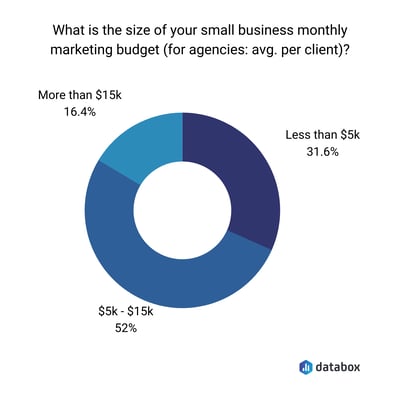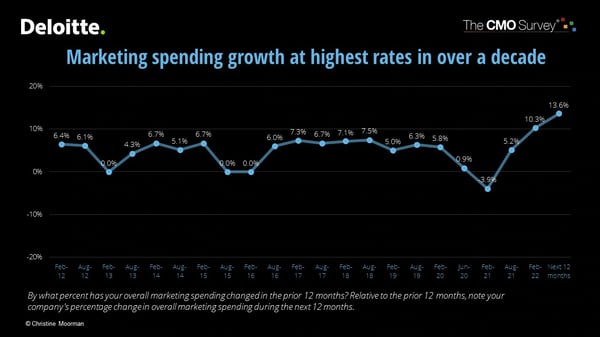Marketing Budget: How Much Should Your Team Spend in 2023? [By Industry]
As a marketer, you’re always pitching new ideas to your team. And you’ve also faced a consistent follow-up question, “How much from our marketing budget do we need to execute?”
Ultimately, being a successful marketer isn’t just about thinking strategically. It’s also about adhering to a strict budget, achieving new levels of growth, and choosing the most cost-effective options for your company.
We’ll explore how you can do these and determine how your budget matches up against competitors. Here’s what we’ll cover:
- Why You Need a Marketing Budget
- Inside a Typical Marketing Budget
- Marketing Budget as a Percentage of Revenue
- Marketing Budgets by Industry
- 6 Expert Tips for Making the Most Out of Your Marketing Budget
Read the full piece for more. You can also learn how HubSpot’s SVP of Marketing will spend a $10 million marketing budget in the podcast below.
Why You Need a Marketing Budget
Today’s marketing landscape is complicated. With recession looming, budget cuts have become common and underperforming marketers quickly fall under the axe. Creating a comprehensive marketing budget is your silver bullet for avoiding these outcomes and having cash to execute your marketing strategy.
Developing a marketing budget also helps you:
- Prioritize projects to invest in.
- Allocate funds for software purchases.
- Compare your year-over-year progress.
- Allocate funds for projects in advance.
- Justify the importance of specific projects.
- Calculate the ROI from your marketing projects.
- Show the value of proposed marketing projects to your higher-ups.
- Show positive ROI, which can help you get a better budget in the future.
- Allocate funds for freelancers and full-time hires who’ll execute your strategy.
Inside a Typical Marketing Budget
Marketing will comprise roughly 13.6% of a company’s total budget in 2023, according to Deloitte’s Annual CMO Survey. That’s up 3.9% from the two previous years.
Even with a recession looming, many marketers expect their annual budgets to increase in 2023.
In a HubSpot survey of 1,000 marketers, 47% of respondents reported that their budget would increase. Another 45% expect their budgets to stay about the same in the new year.

Prioritization of marketing channels is also shifting. Traditional advertising will make up less of 2023’s marketing budget, Deloitte reports, shrinking by 0.7%. Instead, marketers plan on spending more money on social media and new media platforms.
For instance, marketers plan to invest the most in Facebook marketing in 2023. While many marketers already have a robust Facebook strategy, 25% of marketers surveyed by HubSpot will invest in the platform for the first time next year.

Further, video will be a bigger investment in many marketers’ budgets. HubSpot found that 91% of markets plan to increase or maintain their investment in YouTube next year.
Meanwhile, on TikTok, 56% plan on increasing their TikTok investment in 2023 — the highest increase of any social media app. Another 34% plan to maintain their current TikTok budget.
Influencer marketing is another lead-generation tactic worthy of investment. According to our State of Marketing Report, 68% of marketers worked with influencers in 2022 and 88% have a dedicated influencer marketing budget.
This trend will continue in 2023. In fact, 89% of marketers plan to increase or maintain their investment in influencer marketing next year. An additional 17% will invest in this marketing tactic for the first time.
We’ve explored how companies intend to spend next year’s budget. Next, you’ll learn how marketing spend relates to a brand’s revenue. Let’s dive in.
Marketing Budget as a Percentage of Revenue
The amount of revenue businesses allocate to marketing has grown over the past 12 years, with the average at 13.8% of overall company revenue in 2022. That’s over 5% growth since 2011.
B2B product industries allocate, on average, roughly 7.8% of revenue to marketing. This is similar to B2C services (6.5%) and B2B services (5.9%). B2C Product allocates the highest amount at 15.1% of total revenue.
Small businesses are also spending. In a survey of 85 small business owners and marketers, 52% said they’re spending $5–$15,000 per month on marketing.

Decisions related to marketing budget allocation remain largely industry specific. To determine more accurate insights for your business, let’s explore marketing budgets by industry.
Marketing Budgets by Industry
Deloitte recently did a survey showing the percentage of revenue industries should spend on marketing. Here’s the data.
|
INDUSTRY |
MARKETING BUDGET (% OF COMPANY REVENUE) |
|
Banking, Finance, Insurance, and Real Estate |
8% |
|
Communications media |
10% |
|
Consumer packaged goods |
9% |
|
Consumer services |
6% |
|
Education |
3% |
|
Energy |
1% |
|
Healthcare |
18% |
|
Manufacturing |
13% |
|
Mining and construction |
3% |
|
Retail wholesale |
14% |
|
Service consulting |
21% |
|
Technology |
21% |
|
Transportation |
6% |
As a marketer, it’s important you use these percentages as benchmarks, especially for industries allocating low marketing budgets.
If your industry is reluctant to spend on marketing initiatives, that’s an opportunity for your team to shine.
Once you convince the higher-ups about what you need to execute your top strategies, you’ll easily outshine others in your industry and make your company a reference for how other teams should do marketing.
6 Expert Tips for Making the Most Out of Your Marketing Budget
1. Understand your customer journey.
A customer journey is not as straightforward as Googling a term, jumping on an email list, and then converting. The journey is full of twists and turns.
Figuring out how your customers go from product awareness to purchase varies among industries. What works for B2B brands may not work for B2C, or for small businesses.
This is why David Hoos, B2B performance marketing manager at The Outloud Group, says you should take time to understand your customer journey before spending a dime of your marketing budget. If you invest in this research first, you’ll uncover:
- What channels to spend your budget on.
- What platforms to reach your target audience.
- What messages will resonate with them.
- What creative will entertain and educate them.
- What solution will convert them.
Understanding your customer journey is key to unlocking the highest ROI efforts. Done right, this guarantees the best use of your marketing budget.
2. Hire a marketing agency where needed.
It may be difficult to oversee multiple marketing projects without help — even when you have an in-house marketing team.
Besides the time required to hire, train, and onboard a team, you’ll pay salaries and offer some benefits. All this might be a stretch if your budget can’t cater to a huge team or if you don’t have the time to supervise them. This is where marketing agencies come in.
While agencies aren’t cheap, they eliminate some of these challenges and they can function as an extended arm of your team. Partnering with marketing agencies also gives you access to a team of specialists who may help you hit your goals faster and won’t waste your marketing budget.
3. Get an in-house marketing team.
Relying on an agency to run all of your projects isn’t the wisest use of your marketing budget. Marla Malkin, vice president of marketing and strategic partnerships at Attivo ERP, agrees.
4. Invest in content repurposing and updating.
Charlie Southwell, marketing director and SEO specialist at Let’s Talk Talent, notes that creating unique and valuable content is expensive. For this reason, Charlie’s team tries to repurpose everything they create.
Their first step is to produce evergreen content that’ll remain valuable for at least two years. After creating these assets, the team repurposes and promotes them in multiple content formats.
If you have published some evergreen assets a while back, consider updating them. Besides providing current info for your audience, a content update may make your pieces move up the SERPs.
The best part about content repurposing and updating is the leeway to re-promote your assets multiple times a year. In Charlie’s words, “Not doing this is a missed opportunity that prevents content from getting enough mileage and maximizing value from your marketing budget.”
5. De-prioritize underperforming channels.
Understanding the channels that drive the most revenue for your business is critical to marketing budget optimization.
Businesses should constantly assess their campaigns to uncover those that underperform, As says Sidharth Kumar, director of product marketing at Exoprise Systems. Doing so will help optimize spending in the right direction and phase out campaigns that don’t generate any ROI.
If you have data suggesting some underperforming channels might still work, use those channels for experimentation and apply the 70-20-10 rule when budgeting for them.
Here, 70% of your marketing budget goes to proven strategies, 20% goes to new strategies, and 10% goes to experimental strategies, which could highlight opportunities for future growth.
6. Constantly re-evaluate your marketing strategy.
A marketing strategy that’s done right will have objectives and key results, which follow the SMART framework. This is important for budget optimization, as SMART goals and metrics help you track progress and identify channels and campaigns that work.
“Constantly reviewing and re-evaluating your marketing strategy helps you know when to stay the course or pivot,” says Thomas Simon, marketing manager at Monitask. “It also lets you use effective tactics and not blindly follow a particular plan without the data or results to back your decision.”
But how often should you do a review?
Corey Haines, co-founder of SwipeWell, recommends marketers do a biweekly or monthly review of budget allocation. “Regular reviews help you cut unnecessary spending, reallocate to high-performing campaigns, and decide when to increase or decrease variable costs like ad spend,” Corey says.
Manage Your Marketing Budget the Right Way
Now that you know the typical percentage of a marketing budget by percentage and revenue the next step is to learn how to manage your marketing budget.
Check out our guide to managing your marketing budget to refine your strategic plan for 2023.
Editor’s Note: This post was originally published in March 2021 and has been updated for comprehensiveness.
![]()




